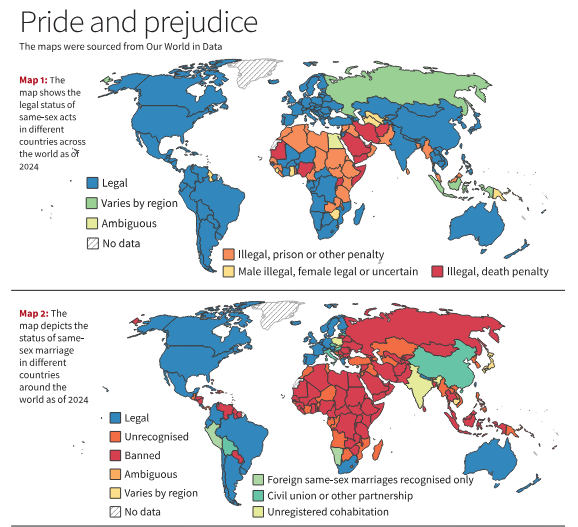Note4Students
From UPSC perspective, the following things are important :
Mains level: Varying rights and status of LGBTQIA+ communities across the world
Why in the news?
Every June, Pride Month is celebrated globally to honour the contributions of LGBTQIA+ community members and to promote love, diversity, and acceptance.
Varying rights and status of LGBTQIA+ communities across the world:

- Legalization and Criminalization of Same-Sex Acts: The legal status of same-sex acts varies significantly while 37 countries have fully legalized same-sex marriage, 59 countries still penalize any expression of queerness, with severe punishments in some regions.
- Marriage Rights: Same-sex marriage is legal in 37 countries, banned in 79 countries, and in some places, same-sex couples can only opt for civil unions, leaving their status partially recognized.
- Employee Protections: Legal protections for queer employees are inconsistent. While 27 countries offer legal aid based on sexual orientation, 90 countries lack any legal protections for queer employees. India and three other countries provide legal aid based on gender identity, including transgender persons.
- Adoption Rights: Adoption rights for same-sex couples also vary. In 39 countries, same-sex parents can adopt children, while 45 countries ban this practice. In 100 countries, single parents can adopt under certain conditions, similar to India’s laws.
- Social and Legal Challenges: Despite legal advancements in some areas, LGBTQIA+ individuals globally continue to face significant social and legal challenges, including discrimination, harassment, and exclusion, with varying levels of legal aid and recognition depending on the country.
Indian Scenario
- Decriminalization of Homosexuality: In 2018, the Supreme Court of India partially struck down Section 377 of the Indian Penal Code, decriminalizing homosexuality. Same-sex couples have the right to cohabitation but not to legal marriage or unions.
- Discrimination and Harassment: Queer individuals in India still face significant discrimination, harassment, and exclusion.
- Legal Protections for Transgender and Intersex Individuals: The Transgender Persons (Protection of Rights) Act, 2019, prohibits unfair treatment in employment, education, healthcare, public facilities, and residence. Legal recourse is available for discrimination based on gender identity but not sexual orientation.
- Adoption Rights: Same-sex couples cannot be recognized as co-parents to an adopted child. Single prospective adoptive parents, regardless of marital status, are allowed to adopt under the Juvenile Justice (Care and Protection of Children) Act, 2015.
Way forward:
- Expand Legal Recognition: Countries should work towards fully recognizing same-sex marriages and providing comprehensive legal protections against discrimination based on sexual orientation and gender identity.
- Education and Awareness: Implement nationwide educational programs to raise awareness about LGBTQIA+ issues, combat stereotypes, and promote understanding and acceptance. This can involve incorporating LGBTQIA+ history and rights into school curriculums and conducting public awareness campaigns.
- Economic Opportunities: Ensure equal opportunities in the workplace by promoting diversity and inclusion policies, providing sensitivity training for employers, and supporting LGBTQIA+ entrepreneurs. Governments and organizations can offer grants, mentorship programs, and other resources to empower LGBTQIA+ individuals economically.
Mains PYQ:
Q ‘Women’s movement in India has not addressed the issues of women of lower social strata.’ Substantiate your view. (UPSC 2018)
Get an IAS/IPS ranker as your 1: 1 personal mentor for UPSC 2024

